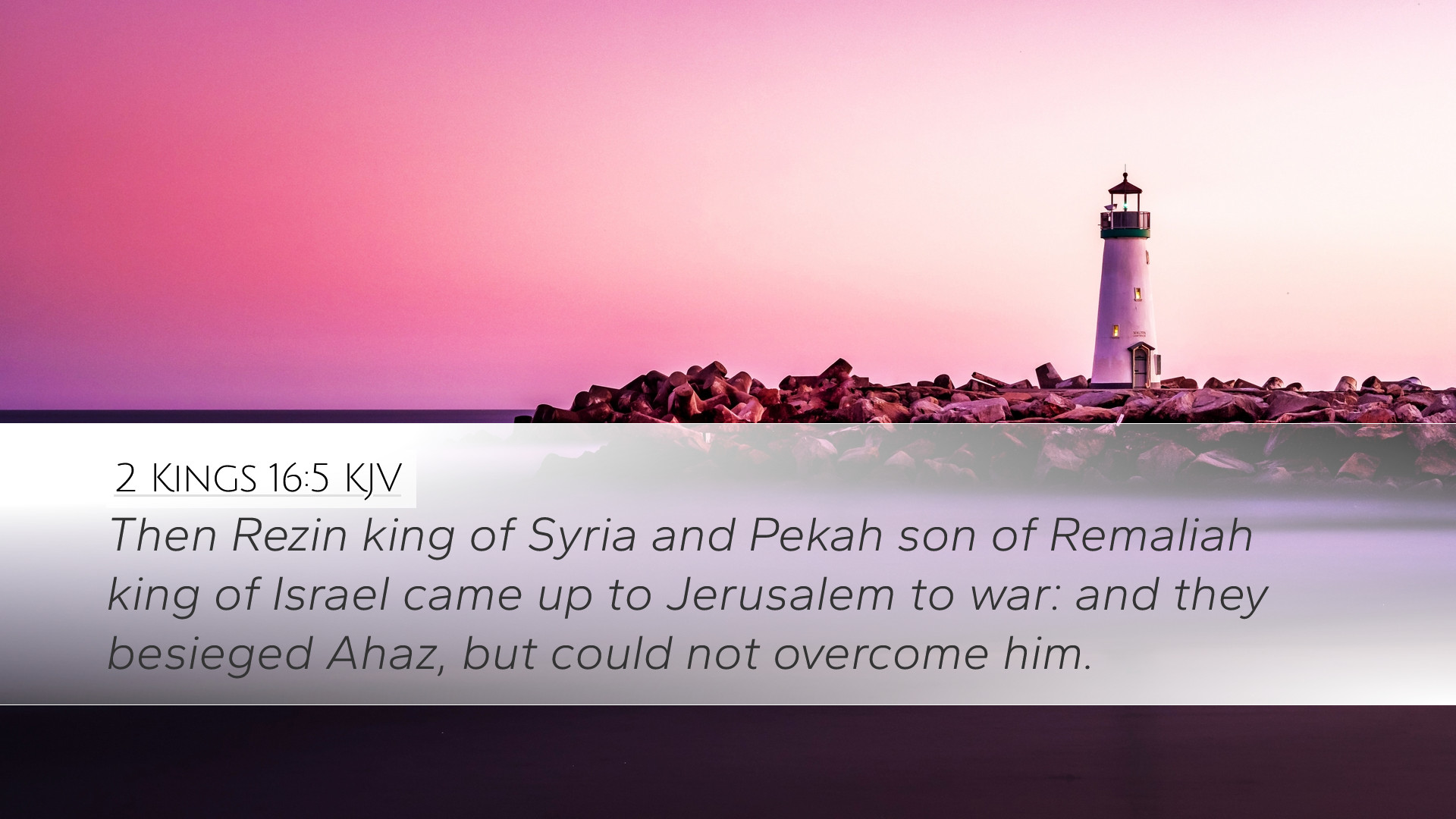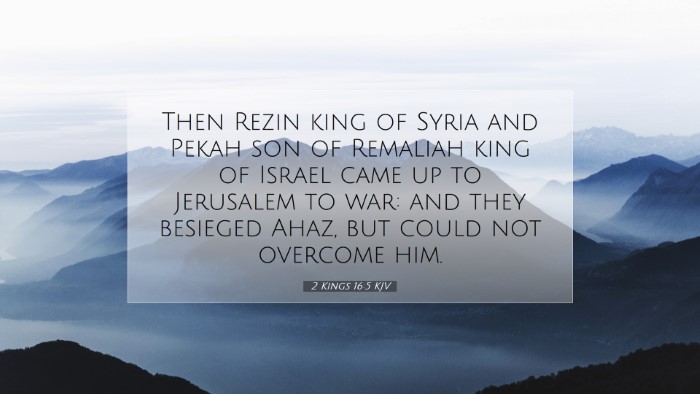Old Testament
Genesis Exodus Leviticus Numbers Deuteronomy Joshua Judges Ruth 1 Samuel 2 Samuel 1 Kings 2 Kings 1 Chronicles 2 Chronicles Ezra Nehemiah Esther Job Psalms Proverbs Ecclesiastes Song of Solomon Isaiah Jeremiah Lamentations Ezekiel Daniel Hosea Joel Amos Obadiah Jonah Micah Nahum Habakkuk Zephaniah Haggai Zechariah Malachi2 Kings 16:5
2 Kings 16:5 KJV
Then Rezin king of Syria and Pekah son of Remaliah king of Israel came up to Jerusalem to war: and they besieged Ahaz, but could not overcome him.
2 Kings 16:5 Bible Commentary
Commentary on 2 Kings 16:5
Verse: "Then Rezin king of Syria and Pekah son of Remaliah king of Israel came up to Jerusalem to war: and they besieged Ahaz, but could not overcome him." (2 Kings 16:5)
Introduction
This verse marks a significant moment in the reign of Ahaz, king of Judah, and serves as a pivotal narrative within the historical context of Israel and Judah during the divided monarchy. Commentators like Matthew Henry, Albert Barnes, and Adam Clarke expound on the implications of this siege and the religious and political dynamics of the time.
Contextual Background
The geopolitical landscape during Ahaz's reign was tumultuous. The alliance between Rezin, king of Syria, and Pekah, king of Israel, sought to undermine Judah and restore their dominance. This alliance is complex, symbolizing not only political maneuvers but also spiritual challenges for Ahaz and the people of Judah.
Commentary Perspectives
Matthew Henry's Commentary
Matthew Henry highlights the **divine providence** at work amidst the conflict. He notes that the siege of Jerusalem was an act of aggression that demonstrated the threats facing Ahaz from both Syria and Israel. Yet, despite their intents, Henry points out that "they could not overcome him," signifying God’s protection over Jerusalem at that time.
Albert Barnes' Commentary
Albert Barnes places significant emphasis on the **historical context** of this verse. He reminds readers of the **idolatrous practices** that Ahaz had adopted, which alienated him from God and rendered Judah vulnerable to such attacks. Barnes argues that Ahaz's reliance on foreign powers for support, rather than turning to God, set the stage for eventual calamity in Judah.
Adam Clarke's Commentary
Adam Clarke discusses the **military alliances** of the time, suggesting that the effective strategy of Israel and Syria signaled a moment of crisis for Judah. Clarke elucidates the **political dynamics** of Ahaz's reign, noting how, despite besiegement, the failure of Rezin and Pekah to capture Jerusalem pointed to a greater allegiance that the people of Judah might have been unaware of—**God’s sovereignty over the fate of His people**.
Theological Implications
The encounter described in this verse represents a profound theological narrative, emphasizing the themes of **divine sovereignty** and **human agency**. While Ahaz pursued questionable alliances, God's overarching will ensured that the city remained intact. This dual tension invites pastors and theologians to explore how human decisions intersect with divine plans.
- Divine Protection: The passage highlights God's commitment to protect Jerusalem despite Ahaz’s failures.
- Human Response: Ahaz's response to the threat—seeking help from Assyria rather than relying on God—demonstrates the need for faithful leadership in times of trial.
- Lessons on Leadership: Ahaz's choices serve as a cautionary tale for contemporary leaders on the importance of faithfulness to God's commandments in governance.
Conclusion
In summation, 2 Kings 16:5 encapsulates a critical moment where the existential threat to Jerusalem highlights both the fragility of human alliances and the enduring presence of God’s promise to His people. This commentary serves as a reminder for pastors, students, and scholars alike to maintain a faithful disposition in the midst of challenges, trusting in God’s protection and ultimate plan for humanity.


